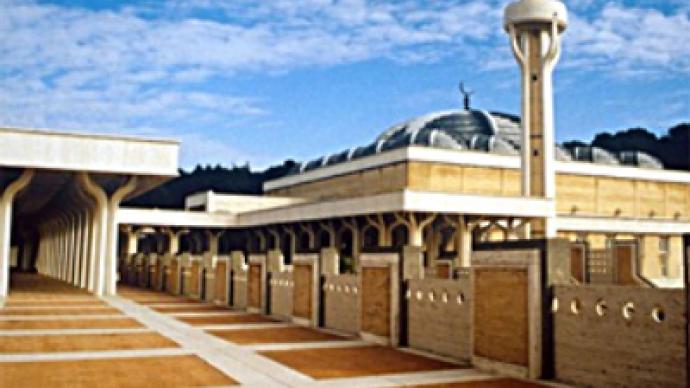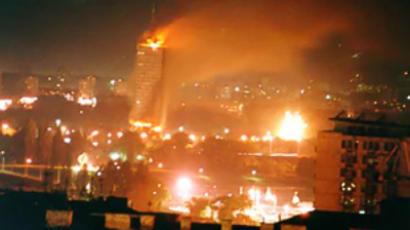Minarets mar Italy?

Italy’s Interior Minister Roberto Maroni is calling for a two-year ban on the construction of new mosques in an effort to curb future terrorist attacks.
The controversial proposal follows the recent arrest of two Moroccan Muslims suspected of having recruited people to launch a holy war on Italian soil.
Following the recent arrest of two suspected Islamic extremists that were plotting a series of terrorist attacks in the northern Italian city of Milan, a fresh wave of anti-Muslim sentiment has swept across the country, and Muslims are feeling the heat more than ever.
Both suspects, 31 year old welder and preacher in the local Islamic centre Rachid Ilhami, and Gafir Abdelkader, a 42-year-old construction worker, were legal residents who lived with their families in town of Macherio, near Milan.
Although Italy has never been hit by an Islamic terrorist attack, many Italians fear that mosques and Islamic centers are potential hotbeds of Islamic extremism. What is more, Italians are increasingly worried about the ‘Islamisation’ of their society in light of the 1.2 million Muslims that live in the country.
Polls show many Italians mistrust Muslims and a third do not want a mosque in their neighborhood. Feeding on Italy’s growing Islamophobia, the anti-immigrant rightwing populist party, the Northern League (NL) has blocked plans to build mosques in Venice, Bologna, Trento and Treviso, and campaigned for the launch of referendums in areas where new mosques are planned.
Citing it as a necessary measure to curb future terrorist attacks, NL has called for a two-year freeze on the construction of mosques. NL exponent Maroni told the national daily La Stampa: “These arrests show that … terrorism is entrenched in Italy, and that we must be vigilant. Unfortunately it is not easy to distinguish between places of worship and those that recruit terrorists and finance the planning of attacks.”
The moratorium is necessary so police can properly monitor existing structures and until parliament passes a law to oversee their construction, Maroni argues.
‘Mosques mushrooming’
“Mosques are springing up like mushrooms, and mayors can do nothing about it because there is no law,” said Roberto Cota, the head of the NL’s group in the Chamber of Deputies. In fact, it is estimated that a new mosque or Muslim prayer hall is set up every four days in Italy.
Today, there are over 800 Islamic centers across Italy, many of which are located in converted buildings including garages, residential homes, warehouses and abandoned stores.* While some are legal and located in municipal buildings, the illegal ones often lack basic safety and hygiene.
Many of these have been shut down in the north. For over a year, Muslims in the city of Treviso have been praying in an open-air supermarket parking lot after the city closed down the mosque because it did not adhere to municipal regulations. This is perhaps the worse example of Muslim intolerance in Italy, says Florence's Imam, Izzeddir Elzir.
Although Elzir says he agrees that officials should shut down illegal, makeshift Islamic centers that pose a threat to the security of its occupants, he believss that if a Muslim centre is closed down by Italian officials, it is also their duty to provide a viable solution.
“You can’t take something away without giving something back”, Elzir says. “Immigration and multiculturalism are realities in Italy, there is no sense in trying to ignore this fact or oppress it; instead we should create instances for dialogue and work together to live better and with more civility”.
When asked about the proposed moratorium on the building of mosques, Elzir believes, “the ban seems like a ploy by some politicians to get more votes”.
Just some bad apples
Centre-left politicians, human rights activists and Muslims in Italy agree. The Head the Italian section of the Muslim World League, Mario Scialoja, said such a law would only exasperate the situation and “create discrimination… and penalise non-Catholic worshipers”. Even the Vatican admonished the mosque ban. Monsignor Gianfranco Ravasi, who heads the Holy See’s culture department, suggested such a ban would be counterproductive, “A place of worship if used as such, is always a source of communion and dialogue”.
Egypt-born Ahmed Khalil, an established resident in Padua, says after 15 years of living in Italy, he still does not feel integrated, “I still get funny looks from people because Italians are diffident towards us; I pay taxes but don’t feel at home here”. When asked about the arrest of the Moroccan men he said they were, “two bad apples that should not ruin the image of Muslims in Italy; the mosque ban would only serve to unfairly punish the vast majority of law-abiding Muslims here”.
* There are only four official mosques in Italy, which are located in Rome, Milan and Palermo. The fourth is under construction in Colle Val d’Elsa (Tuscany) and will be completed in 2009. The mosque in Rome is the biggest in Europe.
Brenda Dionisi for RT













